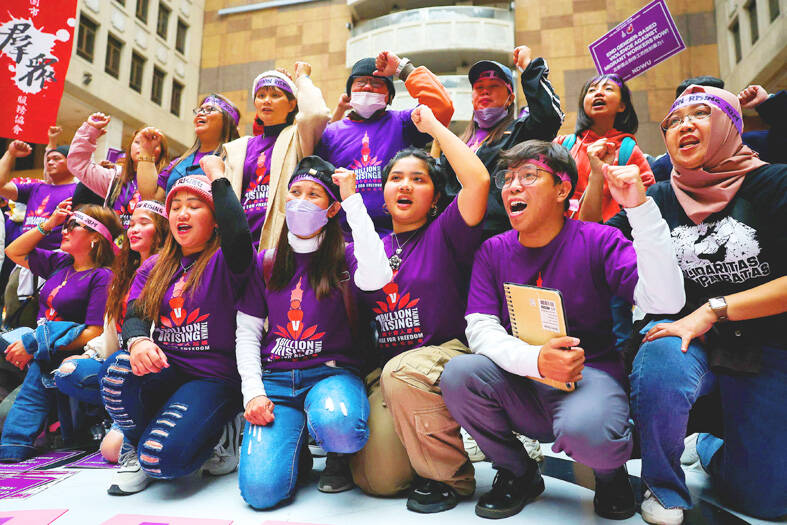Migrant workers yesterday marched against gender-based exploitation and violence against female caretakers, and called for an end to paying high fees to broker agencies, in the lobby of Taipei Railway Station.
Activists and spokespeople for migrant workers from Southeast Asian countries said they were marking International Women’s Day, which was on Friday last week, and protesting discrimination, sexual harassment and unfair labor practices in Taiwan.
Organized by Migrante Taiwan, the National Domestic Workers’ Union, Serve the People Association and other labor rights organizations, the event began outside Taipei Railway Station before protesters marched on the walkway around the station building.

Photo: Ann Wang, Reuters
They held up banners and placards calling for rights for migrant workers, an end to the exploitation of female caretakers and justice for victims of abuse.
After the march, participants held a “dance for freedom” in the main lobby of Taipei Railway Station, which is linked to the One Billion Rising campaign, a global movement to end oppression, abuse and sexual violence against women, Migrante Taiwan chairperson Gilda Banugan said.
“More than 90 percent of domestic caregivers who look after the elderly at home are women migrant workers, while others hold jobs at factories, which they contribute significantly to the Taiwanese society and economy,” Banugan said, adding that these women often experience gender-based discrimination, harassment and even sexual assault, but victims only have limited legal protection.
“The absence of adequate safeguards leaves them vulnerable to exploitation and abuse,” Banugan said.
Speakers took turns to talk about their experience of discrimination.
Francia Balderama, a Filipino labor activist, said that she has worked in Taiwan for 11 years, in factories and as a caregiver, and that her work in the nation would soon be over, but she does not have retirement benefits or welfare assistance and therefore asked for better rights protections and wage support under labor laws.
Balderama also requested that her home country take responsibility to provide more financial support for migrant workers who return after working abroad.
Activists held banners in English and Tagalog saying: “Hold PH government accountable, end forced labor migration,” “Create more jobs in the Philippines” and “Resist BBM’s foreign-dependent charter change.”
“BBM” refers to Philippine President Ferdinand "Bongbong" Marcos Jr.

CHANGING LANDSCAPE: Many of the part-time programs for educators were no longer needed, as many teachers obtain a graduate degree before joining the workforce, experts said Taiwanese universities this year canceled 86 programs, Ministry of Education data showed, with educators attributing the closures to the nation’s low birthrate as well as shifting trends. Fifty-three of the shuttered programs were part-time postgraduate degree programs, about 62 percent of the total, the most in the past five years, the data showed. National Taiwan Normal University (NTNU) discontinued the most part-time master’s programs, at 16: chemistry, life science, earth science, physics, fine arts, music, special education, health promotion and health education, educational psychology and counseling, education, design, Chinese as a second language, library and information sciences, mechatronics engineering, history, physical education

The High Prosecutors’ Office yesterday withdrew an appeal against the acquittal of a former bank manager 22 years after his death, marking Taiwan’s first instance of prosecutors rendering posthumous justice to a wrongfully convicted defendant. Chu Ching-en (諸慶恩) — formerly a manager at the Taipei branch of BNP Paribas — was in 1999 accused by Weng Mao-chung (翁茂鍾), then-president of Chia Her Industrial Co, of forging a request for a fixed deposit of US$10 million by I-Hwa Industrial Co, a subsidiary of Chia Her, which was used as collateral. Chu was ruled not guilty in the first trial, but was found guilty

Taiwan-based publisher Li Yanhe (李延賀) has been sentenced to three years in prison, fined 50,000 yuan (US$6,890) in personal assets and deprived political rights for one year for “inciting secession” in China, China's Taiwan Affairs Office spokesman Chen Binhua (陳斌華) said today. The Shanghai First Intermediate People’s Court announced the verdict on Feb. 17, Chen said. The trial was conducted lawfully, and in an open and fair manner, he said, adding that the verdict has since come into legal effect. The defendant reportedly admitted guilt and would appeal within the statutory appeal period, he said, adding that the defendant and his family have

DEADLOCK: As the commission is unable to forum a quorum to review license renewal applications, the channel operators are not at fault and can air past their license date The National Communications Commission (NCC) yesterday said that the Public Television Service (PTS) and 36 other television and radio broadcasters could continue airing, despite the commission’s inability to meet a quorum to review their license renewal applications. The licenses of PTS and the other channels are set to expire between this month and June. The National Communications Commission Organization Act (國家通訊傳播委員會組織法) stipulates that the commission must meet the mandated quorum of four to hold a valid meeting. The seven-member commission currently has only three commissioners. “We have informed the channel operators of the progress we have made in reviewing their license renewal applications, and